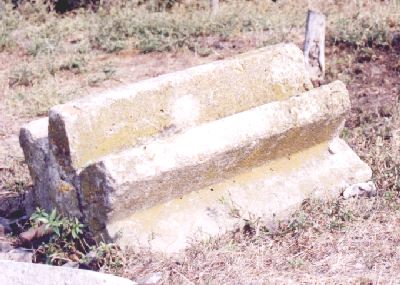 This threshing stone lay between the street and a yard in Lindenau
(today known as Lyubimovka). This threshing stone lay between the street and a yard in Lindenau
(today known as Lyubimovka). Threshing stones, with an iron axle, were dragged
over the threshing floor by horses in the 19th century, crushing the heads of wheat to
loosen the grain from the chaff.
The stone's shape has come to be familiar; Bethel College in North Newton, Kansas, has the
Thresher as their mascot, and replicas of these old stones can be seen in central-Kansas
yards. I once read a report that a Mennonite in the 1870s, not realizing that there
were better ways to thresh, had a boatload shipped over, and they were never used.
In Neukirch, we also found threshing stones, there
put to a modern use: support for the seat of a bench.
Little else in Lindenau remains even of 20th century Mennonites. Our 4-G
grandparents, Klaas
and Elizabeth Friesen came from Prussia to help found this village in 1803. They
were very poor in Prussia, but were able to get to the border and advantage of Russian aid
in form of a horse and wagon. The trip to South Russia had its additional trial;
one daughter, Helena, died on the way. They found their way to Chortitza Colony and
spent a year with relatives before settling on these open steppes on Lindenau farm number
13. Another daughter, and our ancestor Anna, was born in
Lindenau shortly thereafter. |